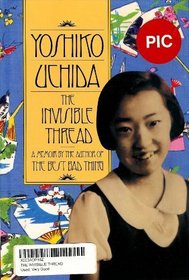When Japan bombed Pearl Harbor, Yoshiko and her family along with 120,000 West Coast Japanese Americans, suffered the most cruel and unjust rejection of all. Because they looked like the enemy, our government treated them as the enemy. Because our government feared they might be disloyal, they were imprisoned, without trial or hearing, in concentration camps.
Enduring this tragedy, Yoshiko slowly came to acknowledge the invisible thread that liked her to her Japanese heritage - a legacy that gave her the strength to withstand the deprivation of that dusty,l desolate prison camp called Topaz. Yoshiko and her family survived the ordeal with their spirit and courage intact. And it is that quiet strength that enabled Yoshiko to write this moving memoir with such power and has infused her novels with such poignancy and warmth.
Enduring this tragedy, Yoshiko slowly came to acknowledge the invisible thread that liked her to her Japanese heritage - a legacy that gave her the strength to withstand the deprivation of that dusty,l desolate prison camp called Topaz. Yoshiko and her family survived the ordeal with their spirit and courage intact. And it is that quiet strength that enabled Yoshiko to write this moving memoir with such power and has infused her novels with such poignancy and warmth.




